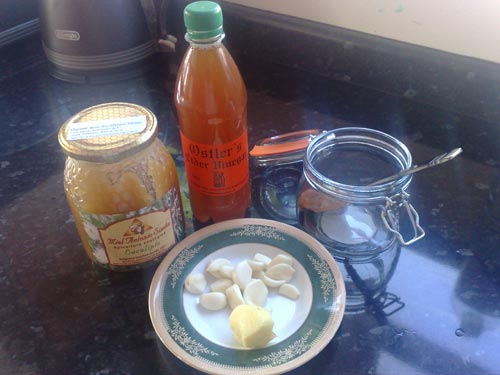
Via: Online College Courses Blog
by mail from Muhammad Saleem
 Deodorant and anti-perspirants are used to prevent embarrassing social
situations. Naturally, smelling nice is part of good personal hygiene.
Deodorant and anti-perspirants are used to prevent embarrassing social
situations. Naturally, smelling nice is part of good personal hygiene.

Chapter: Regarding the Encouragement of Teaching medicine His (alayhis salaatu was-salaam's) saying, "Allaah did not send down a disease except that it has a cure" has already preceded. We say: This (hadeeth) necessitates the mobilization the people's [lofty] concerns [for medicine] and incitement of (their) determinations to learn medicine. And it has already preceded that medicine is a skill. Imaam al-Shaafi'ee said, "I don't know of a knowledge more noble than medicine after the halaal and haraam." And he used to be concerned (and grieved) over what the Muslims had neglected of medicine, and he would say, "They have neglected one third of knowledge and have entrusted it to the Jews and Christians." And he used to say, "Indeed the Ahl al-Kitaab have dominated us with respect to medicine." And al-Shaafi'ee, alongside his greatness in the knowledge of the Sharee'ah, and his great skill in Arabic was also insightful in medicine. The writer (i.e. al-Dhahabi) says: And I have seen our Shaykh, Shaykh Ibraaheem al-Raqiyy to be insightful in medicine, and likewise our Shaykh, Shaykh Taqi al-Din Ibn Taymiyyah, and Shaykh Imaad al-Din al-Waasitee (rahimahullaau ta'aalaa) [were insightful in medicine]. Hippocrates and others have said, "Medicine is inspired by Allaah," and Hippocrates is the chief of this discipline. His school of thought regarding it is the sound, correct school of thought. He was followed therein by Galen who is the leading scholar of this discipline as well, and both of them are venerated a great deal by the physicians.
 The apple cider vinegar must be unfiltered and the honey must be raw, unpasteurised (and preferably organic) honey for all the benefits to be realised. One of the main reasons honey
is pasteurised is to speed up the packaging process (heating makes it
flow much quicker) - so pretty much all honeys from supermarkets will be
unsuitable.
The apple cider vinegar must be unfiltered and the honey must be raw, unpasteurised (and preferably organic) honey for all the benefits to be realised. One of the main reasons honey
is pasteurised is to speed up the packaging process (heating makes it
flow much quicker) - so pretty much all honeys from supermarkets will be
unsuitable. 
 The teachings of the Holy Qur'an for the Child to follow during his life
is: "Your Lord (Allah) has ordained that you should worship none except
Him and show kindness to parents. If one of them or both of them attain
to old age with you, say not 'Fie' unto them nor reproach them but
speak to them a gracious word. And lower unto them the wing of
submission through mercy (defer humbly to them out of tenderness) and
pray: My Lord, have mercy on them both as they nurtured me when I was
little." (Qur'an 17:23-24)
The teachings of the Holy Qur'an for the Child to follow during his life
is: "Your Lord (Allah) has ordained that you should worship none except
Him and show kindness to parents. If one of them or both of them attain
to old age with you, say not 'Fie' unto them nor reproach them but
speak to them a gracious word. And lower unto them the wing of
submission through mercy (defer humbly to them out of tenderness) and
pray: My Lord, have mercy on them both as they nurtured me when I was
little." (Qur'an 17:23-24)
This article is based on answers by prominent scholars like, Shaikh Muhammad Ibn Saalih al-Uthaymeen (Majmoo Fataawa wa Rasa’il Fadeelat), Shaykh Bakr Abu Zayd (Mu’jam al-Manaahi al-Lafziyyah), Shaykh Abd al-Aziz Ibn Abdullah Ibn Baaz (Kitaab Majmoo Fataawa wa Maqaalaat Mutanawwi’ah li Samaahat), Shaikh Muhammad S. Al-Munajjad and others.* T A S M I Y A *

This article is based on answers by prominent scholars like, Shaikh Muhammad Ibn Saalih al-Uthaymeen (Majmoo Fataawa wa Rasa’il Fadeelat), Shaykh Bakr Abu Zayd (Mu’jam al-Manaahi al-Lafziyyah), Shaykh Abd al-Aziz Ibn Abdullah Ibn Baaz (Kitaab Majmoo Fataawa wa Maqaalaat Mutanawwi’ah li Samaahat), Shaikh Muhammad S. Al-Munajjad and others.
Do names effect the child’s character?
Names do not have any effect on the child’s character or personality, except that the meaning of the name would inspire him, when he grows old enough to understand its meaning and indication. A good and pleasant name would motivate the person to do good acts and inspire him strength and honor, since he is repeatedly called by it.
For example, if the child is named ‘Abdullah‘ meaning ‘a slave of Allah‘; his name will make him realize and keep him aware of his servitude to Allah. He will understand his true role and the purpose of life. Likewise, if he is named after the Khalifah Uthmaan Ibn Affan; the character, qualities and actions of Uthmaan Ibn Affan (radhiyallahu anhu) would influence him. It might even lead him to perform actions, which befit his name and prevent those, which conflict its character. Similar is the case with unpleasant names, which denote bad qualities and actions. A bad name might even provoke the person to do evil!!
Before you decide a name for your child, it is good to consider some important details. Know that the name, which you decide for your child will stay with him all through his life, therefore the name you choose should not embarrass or humiliate his personality.
You should bear in mind the different stages of life and give him a name which would sound good as a child, a youth, an adult, a father, etc. and how it would suit the father to be called as, ‘Abu foolan’ meaning, ‘Father of so and so.’ Because a name which causes embarrassment or discomfort might be a cause of bad feelings of the child towards his parents.


